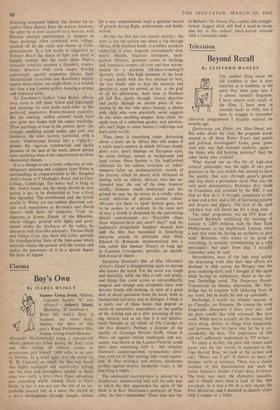Television
Beyond Recall
By CLIFFORD HANLEY THE saddest thing about the old trashbox is that it does function as a trashbox, in the sense that what goes into it is almost instantly forgotten.
I have almost total recall of the films I have seen in cinemas back to 1930, but I have to struggle to remember television programmes I actually enjoyed six months ago.
Quatermass, yes. Pinter, yes. Alun Owen, yes. But what about the vital, the pregnant words uttered in all those Brains Trusts and panels and political monologues? Gone, gone, gone. And who was that national celebrity, again— the bloke who did knitting patterns? And the other bloke who cooked?
What started me on this bit of high-class oriental philosophy was the sight of two pro- grammes in the past month that seemed to have the quality that cuts through gazer's gloom and may leave a permanent mark. One was the very quiet documentary, Rickshaw Boy, made by Canadians and screened by the BBC. I can find no flaw in it. It brought completely to life a man and a boy, and a life of lacerating poverty and despair and dignity. The face of the aged rickshaw boy will haunt me for a long time.
The other programme was an ITV hour of Leonard Bernstein explaining the meaning of melody to 2,000 children, with the New York Philharmonic as his blackboard. Lumme, what a lark that must be, having an orchestra to play with! Bernstein, who seems to be good at everything, is certainly overwhelming as a telly personality; but apart from that, I actually remember what he said.
Nevertheless, most of the lads must accept the depressing truth that their best efforts are destined to slide across the Perspex into the great enduring dark; and I thought of this again while having an enthusiastic shufti at the cur- rent Durbridge serial, The Desperate People. Transmitted on Sunday afternoons, Mr. Dur- bridge has to compete with bickering brats in my street, but he holds his end up splendidly.
Durbridge, I would say without rancour, is no Chandler, no Simenon. He creates the most forgettable characters I have ever met, and his plots ramify like wild wireweed. But they work. While they're actually on the screen, they drive along, dozens of things keep happening, and however thin his hero may be, he is un- mistakably the hero. The importance of this still isn't sufficiently understood by TV writers.
To enjoy a thriller, the poor old viewer must know who he, the viewer, is supposed to be Like Harold Ross. we look at the picture and ask: 'Where am I at?' If there's no hero, of heroine, we're at nowhere. There was a classic instance of this disorientation last week in Julian Symons's thriller I Can't Bear Violence. The story was okay, the characters passable; and it should have been a load of fun. But everybody in it was a bit of a twit, except the First Murderee, and I declined to identify either with a corpse or a killer.


































 Previous page
Previous page